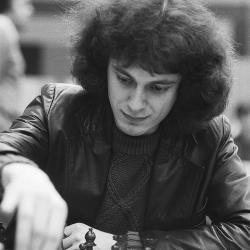GM John Nunn

Bio
John Nunn is a British chess grandmaster and national champion, achieving the GM title in 1978 and the British championship in 1980-81. Author or co-author of nearly 30 chess books, he is one of the top chess writers as well.
Early Life And Career
Born in London in 1955, Nunn was very successful in junior British chess events as well as scholastic tournaments in the mid- to late-1960s. By the end of the decade, he was playing often against fellow future British GMs Anthony Miles and Jon Speelman. Nunn was also a terrific student, attending Oxford at age 15 in 1970. By then he was playing in minor international tournaments. (All of the above is from Nunn’s extensive writings on his early chess career in the 1997 edition of Secrets of Grandmaster Chess.)
The first half of the 1970s culminated with Nunn winning the 1975 British Junior Championship as well as earning the IM title that same year. The year before he played one of his best games, a mating attack as Black against the Vienna Game. In the second half of the 1970s, Nunn continued to progress, and he made GM in 1978. He was England’s fourth grandmaster, after Miles, Raymond Keene, and Michael Stean (fifth counting the German-born Jacques Mieses, one of the original grandmasters from 1950 who had moved to Britain after the Second World War).
Prime Years
Nunn won his only British Championship in 1980, although he did not officially claim it until February 1981 after defeating IM William Hartston in a tiebreaker. Other successful tournaments included his three first-place finishes at Wijk aan Zee in 1982, ’90, and ’91. In the 1985 Wijk tournament, Nunn played probably his most famous career game, against Soviet GM Alexander Beliavsky.
Nunn was never a candidate for the world championship, finishing seventh and fourth in his two Interzonal tournaments. First came Toluca 1982, then his near-miss in 1987 at Szirak. There he won nine of his 17 games with two losses for a score of 12/17, tied for third-best in the tournament. The top three players advanced, but due to a lost tiebreaker with GM Lajos Portisch, Nunn did not make it to the Candidates. As a no-doubt minor consolation, he won the tournament’s first brilliancy prize.
In between the Interzonals came one of the greatest successes of Nunn’s career, at the 1984 Olympiad in Thessaloniki, Greece. On England’s second board, Nunn played in 11 of the 14 rounds and won nine of those games without a loss. It gave him a performance rating of 2868, best in the tournament. England finished second to the Soviet Union, their first of three consecutive silver medals. In the last of these, in 1988, Nunn was the tournament’s second-best player on the third board with five wins and no losses in 12 games. Overall, Nunn played in 10 Olympiads and was a member of five top-three English finishers.

Recent Years And Writing
Although outside the world top-10 by 1995, Nunn achieved the best rating of his career, 2630, in January. A tie for second behind GM Viktor Korchnoi at the Pan Pacific International in San Francisco was his top result of the year.
Nunn has rarely played since 2002, with fewer than one event per year. He has mostly participated in the World Senior Chess Championship, where he finished third in 2014 and won the 65+ championship in 2022 and again in 2023. He did become grandmaster for the second time in 2004—a GM of chess problem-solving, one of just four players to earn both of these GM titles.

Nunn continued to write in retirement as well. From 1982 to 2014 he authored or co-authored at least 29 chess books, from a treatise on the Benoni Opening in ’82 to his Chess Course based on the games of turn-of-the-century world champion Emanuel Lasker in ’14. Nunn may have been a better or more prolific chess writer than chess player, and he was a fantastic player.


